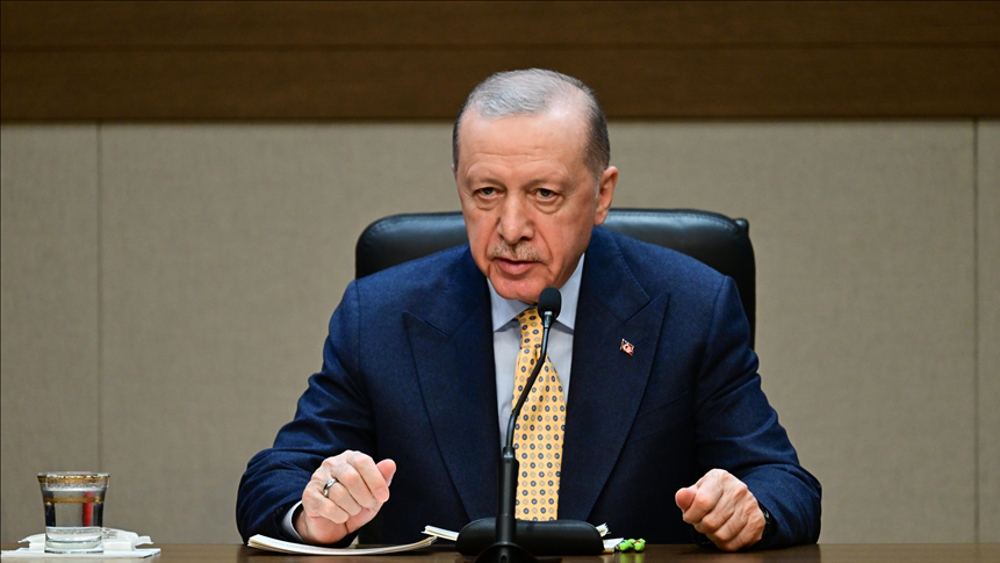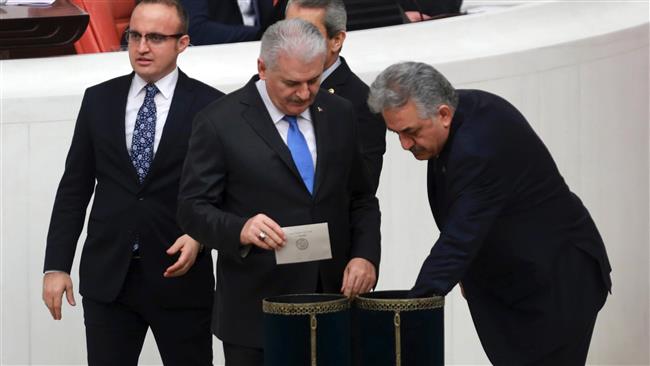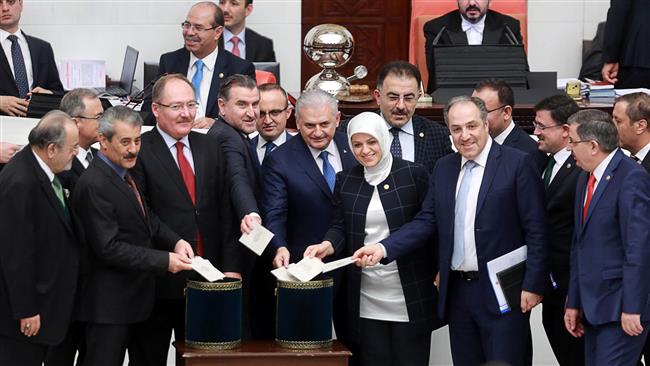Turkish parliament votes in favor of constitution reform package
Turkish lawmakers have voted in favor of a controversial reform bill that would grant additional executive powers to President Recep Tayyip Erdogan
The legislators approved the final 15-18 articles of the constitutional reform package early on Saturday with 339 votes in favor, after articles 8-14 were passed throughout Friday, Turkey’s official Anadolu news agency reported.
The final articles reportedly deal with the annual budget, removal of the Council of Ministers, regulations on presidential and parliamentary elections, and a provision that allows the president to retain ties to his or her political party.
The 18-article bill for constitutional amendments would now take Turkey away from its current parliamentary system, and introduce an executive presidency instead.
Under the new mechanism, which still has to be put to a national referendum for final approval, Erdogan would be allowed to serve two five-year tenures in office, meaning he could be leading Turkey until 2029.
The constitutional reform package would also enable the president to appoint and dismiss government officials at his own discretion.

The president would further be able to be a party member, thus giving Erdogan a permit to return to the leadership of the ruling Justice and Development Party (AKP), which he himself has founded.
Moreover, the number of parliamentarians will be increased from 550 to 600, the minimum age to be a lawmaker will be lowered to 18 from 25, and parliamentary and presidential elections will be held together every five years.
The AKP and far-right Nationalist Movement Party (MHP) maintain that constitutional amendments will create a strong executive leadership contrary to the fragile coalition governments of the past.
The leader of Turkey's main opposition Republican People's Party (CHP) has, however, expressed strong opposition to the changes, saying the legislators who ratify the bill will be betraying the public.

“Those who say ‘yes’ to this will be betraying the citizens who voted for him/her. They are giving the authority to annul the parliament, which represents 100 percent of the people, to a president who was elected by 51 percent of the votes,” Kemal Kilicdaroglu said in an address to the members of his party during a meeting in the capital Ankara on January 10.
The Turkish legislature’s third biggest party, the Peoples’ Democratic Party (HDP), also opposes the constitutional reforms.
The drive for the constitutional change and expanding Erdogan’s powers come as the AKP has 317 of the 550 seats in the parliament. Calling a referendum on the constitution in Turkey requires 330 votes, which means the governing party needs more than a dozen votes from its allies in the MHP.
Deputy Prime Minister Nurettin Canikli has said the referendum could take place in March, April or May.

Erdogan: No power can remove Palestinians from their 'eternal' homeland

Turkey plans to establish military bases in Syria: Report

Turkey says Israeli airstrike killed three nationals on Lebanon border
Greek PM: Europe should ‘wake up,’ reduce reliance on US
Occupied al-Qud archbishop: Palestine will never forget Nasrallah
IRGC begins major Eqtedar drill in eastern Iran
Trump tells Zelensky to secure peace with Russia or risk losing Ukraine
Arrest of Electronic Intifada journalist exposes deep Zionist footprints in Switzerland
Iran, Azerbaijan stress opposition to foreign forces in South Caucasus
VIDEO | Press TV's news headlines
Iranian president wishes health, speedy recovery for Pope Francis













 This makes it easy to access the Press TV website
This makes it easy to access the Press TV website